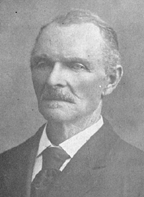

by Maka MacKenna

I go to Kneeland once a year. I go when the local TV news starts showing the snowfall up there and running the annual reminders not to go sightseeing because -- don't forget, folks -- it's all privately owned and fenced off.
Of course that reminds me it's time to go, so the dogs pile into the car and off we go up the windy road. I go because of my great-grandfather, James Nellis, about whom I will never know enough. It's a hard prospect trying to get to know someone who died before I was born, who wasn't very communicative in life, and about whom the relatives tell conflicting stories. We do know he was one of the Irish ranchers who settled in Kneeland back in the1860s and he had neighbors with names like Fitzgerald and Devoy and Mullen.
There are old Army diaries that mention the Nellis ranch as a stopover for troops moving from Fort Humboldt to Iaqua during the Indian wars. There's a diary by a young girl of a journey to Bald Hills in 1874 in which she describes riding eight miles up from Freshwater to "Mr. Nellis's, a very beautiful place indeed" and snacking on their plums and pears.
We drive carefully up the twisting road until the roadside is white with slush and somewhere around the eight mile line I find a place to pull over where we won't disturb anyone. The dogs are delighted to play in the snow for about five minutes, then they want to get back in the car.
I look around the frosted rolling hills, trying to imagine plum trees and pear trees, trying to imagine how it looked to a young Jimmy Nellis. Born in 1839, he would have been 13 or 14 during the worst years of the Famine and would have seen the horror of a million people slowly starving to death, maybe his own family. He would have been 20 when he made his hellish transatlantic passage in steerage. Kneeland must have looked like Heaven.
Jimmy was a man of such mystery we don't even know where he came from. His papers say "Irish" but give no place of birth. He and great-grandma never talked about the old country and didn't encourage questions. They didn't come from the storybook Ireland of shamrocks and leprechauns, but from a place so terrible they'd risked everything to leave.
Wherever his birthplace, an Irishman with a Scots accent was likely from Ulster, and probably sailed from Derry, where there's a monument to the thousands of families who said goodbye at the quay, most of them never to be reunited. You can still feel the sorrow in the very stones of the place, all these years later.
Jimmy Nellis prospered in Kneeland. He had a ranch and a shingle mill, and later ranched and milled in Elk River. He and great-grandma bought real estate. They eventually moved into the big house in Eureka and he lived to see his children go to college. At the end of his life, he sat by the kitchen fire and practiced writing his name, taught by his schoolteacher daughter. He died a rich man, but never learned to read and write.
It's getting dark and time to head back down to town. I take a last look around. I know there were apple orchards in the old days and I try to imagine them.
And I'd like to think that Jimmy Nellis stood in this spot or nearby and looked over the golden hills on an autumn afternoon. And I'd like to think that he looked over his pear trees and plum trees and apple trees and his cattle and felt happy.
And I'd like to think that on one of those afternoons up in Kneeland, for the first time in his wretched life, Jimmy Nellis smiled.
Maka MacKenna is a Eureka free-lance writer.